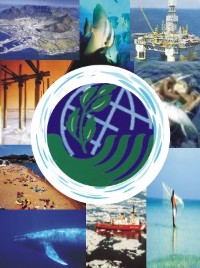|
|
|
IISD's
Summary Report is available online in HTML  TEXT
TEXT  PDF
PDF
|
|
|
Highlights
for Wednesday, 5 December 2001
|
|
|
|
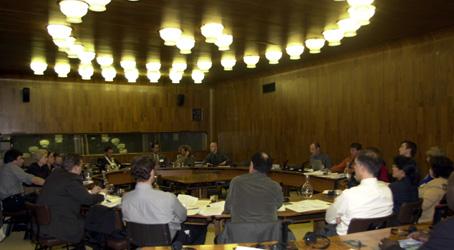
Conference participants met throughout the day on Wednesday, hearing panel
presentations and generating discussion on: national and local
perspectives on integrated coastal management (ICM); national ocean policy
and planning and management of exclusive economic zones (EEZs);
sustainable use of fisheries and aquaculture; and present status and
future directions in marine protected areas (MPAs). Left photo and below:
Drafting group of Working Group 4.
|
|
|
|
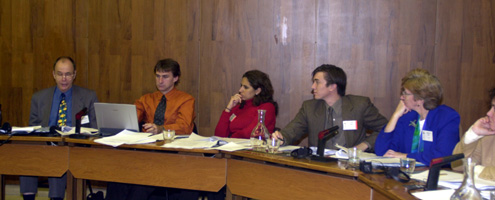
The Working Groups and Drafting Committee continued to make progress
during morning, afternoon and evening sessions. A draft Co-Chairs Report
and an annex containing preliminary reports from the Working Groups were
distributed to participants for review.
|
|
|
|
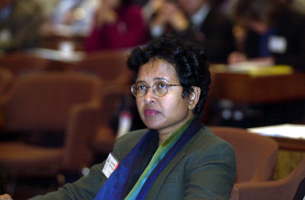
Indumathie Hewawasam (right), World
Bank, reported on the proceedings of the second day, outlining the
panels and touching on points raised including the need for an ecosystem
approach, the idea of a "triage" conservation approach for coral
reefs, regional commonalities in ICM, the debate on ocean sequestration
and its effects on ocean biodiversity and the idea of a private sector
network on ocean sustainability.
|
|
|
|
PANEL 8: INTEGRATED
COASTAL MANAGEMENT (ICM)
|
|
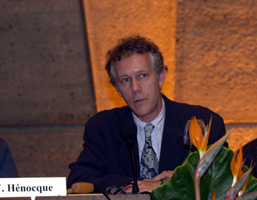
This panel presented specific national and local cases of ICM, analyzing
major outcomes, lessons learned, replication of programs, and
institutional change. Panel Chair Yves Hénocque,
IFREMER, introduced the panel.
|
|
|
|
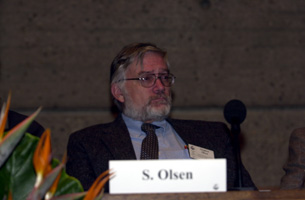
Stephen Olsen (left), Coastal Resources Center, University of Rhode
Island, US, presented a breakdown of ICM based on four stages of action:
establishing machinery for sustainable development; reducing and
mitigating behavior; improving environmental and resource quality; and
ensuring the sustainability of achievements.
|
|
|
|
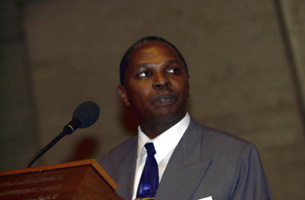
Jeremiah Daffa, National Environment Managing Council, Tanzania, outlined
the Tanzanian context for ICM and offered a perspective on local ICM
programs, including marine parks and coastal management.
|
|
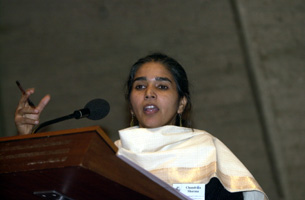
Chandrica Sharma, International Collective in Support
of Fishworkers, drew on the outcomes of two multi-stakeholder workshops to
address threats to coastal ecosystems and impacts of the fisheries sector
in South Asia.
|
|
|
|
Camille
Mageau, Department of Fisheries and Oceans, Canada, explained that
Canada's approach to ICM is
based on a geographic framework of regional and local management areas,
comprising multiple economic zones and recognizing continuity between
land- and marine-based ecosystems.
|
|
|
|
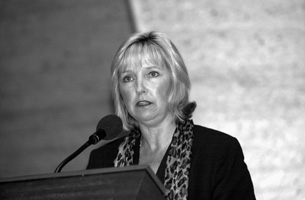
Diane
James, Victorian Coastal Council, offered an Australian perspective of ICM,
contrasting planning and management policies at the state and national
levels.
|
|
|
|

Bambang Wahyudi (left), on behalf of the Minister of Marine Affairs and
Fisheries, Indonesia, discussed decentralization of management and
financial authorities in Indonesia and highlighted recognition of the need
to integrate coastal governance.
|
|
|
|
PANEL 9: NATIONAL OCEAN
POLICY AND PLANNING AND MANAGEMENT OF EXCLUSIVE ECONOMIC ZONES (EEZs)
|
|
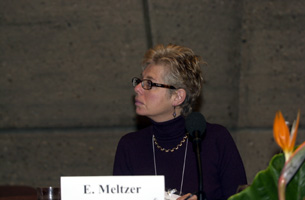
This panel addressed national planning for ocean conservation and
development, including policies, projects and planning for use and
conservation of Exclusive Economic Zones (EEZs). Panel
Chair Evelyne Meltzer (right), Department of Fisheries and Oceans, Canada,
introduced the speakers.
|
|
|
|
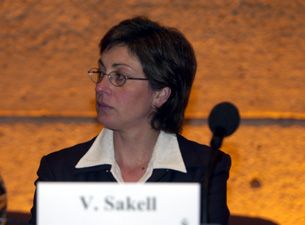
Veronica
Sakell (right), National Oceans Office, Australia, discussed
the implementation of Australia's Oceans
Policy, launched in 1998, outlining responsibilities for coordinating
institutional arrangements and principles of regional marine planning. She
highlighted the southeast marine region as an example and stressed the
importance of nesting spatial frameworks.
|
|
|
|

Matthew King (right), Department of Fisheries and Oceans, Canada,
discussed the Oceans Act and the policy process and frameworks
developed to implement three key programs on MPAs, integrated management
and marine environmental quality.
|
|
|
|
Martin
Tsamenyi, University of Wollongong, Australia, focused
on actions taken by island nations toward EEZ management.
|
|
|
|
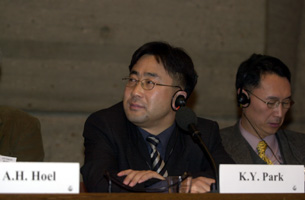
Kwang Youl Park (right), Ministry of Maritime Affairs and
Fisheries, Korea, discussed the new ministry's approach to oceans
governance, including sustainable development of marine resources through
Ocean Korea 21, Chapter 17 and EEZ planning programmes, and noted the need
for harmonizing ministries, achieving progress toward ecosystem-based and
precautionary approaches and encouraging development and application of
sustainable indicators.
|
|
|
|
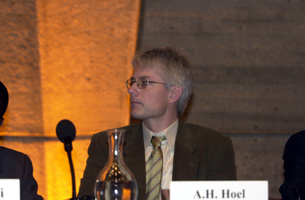
Alf Håkon Hoel (right), University of Tromsoe, Norway, said Norway is
a major beneficiary of extended jurisdiction through EEZs and outlined
measures for EEZ management through international agreements and domestic
responses.
|
|
|
|

Mao Bin, Representative of the People's Republic of China to the
International Seabed Authority, gave a brief history of China's coastal
zone management and highlighted government efforts to increase awareness
of the marine environment, including formation of a national network for
marine environment monitoring and creation of a national ocean development
plan and national marine policy.
|
|
|
|
Chair Meltzer presented key points and recommendations
compiled by the panel. They emphasized, inter alia, that: EEZs
should be managed seamlessly with coastal zones; lack of institutional
understanding in this new area requires a high threshold of caution in
decision-making; and harmonization between countries is needed to manage
overlapping zones and transboundary effects.
|
|
|
|
PANEL 10: FISHERIES AND
AQUACULTURE
|
|
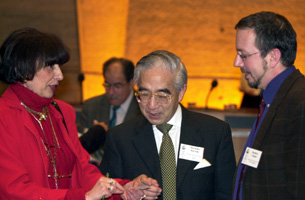
This panel addressed major issues related to marine fishing activities
and the development of coastal and oceanic aquaculture around the world,
including activities and interaction of industrial and small-scale
fisheries, risks and benefits of marine aquaculture, fishery and
aquaculture impacts on marine ecosystems, and fishing activities in areas
of national jurisdiction and in the high seas. Panel
Chair Moritaka Hayashi, Waseda University School of Law, Japan,
introduced the speakers.
|
|
|
|
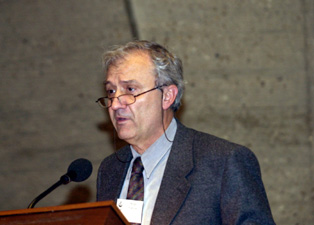 
Serge Garcia (right), Fisheries Resources and Environmental Division, FAO, presented a status report on central issues in global fisheries,
including overfishing, overcapacity, the harmful role of subsidies and
poor statistics and monitoring, and listed new initiatives to address
these problems.
|
|
|
|
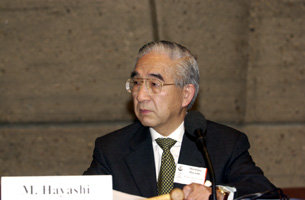 
Moritaka Hayashi,
Waseda University School of Law, Japan,
reviewed his work on progress
achieved on sustainable use and conservation of high seas living
resources, noting the concept of sustainable use has been adopted by
several conventions and become the objective of management regimes of
migratory and straddling fish stocks.
|
|
|
|

Anamarija Frankic, Virginia Institute of Marine Science, USA,
defined sustainable aquaculture
as a fast-growing industry with increasing consumer demand for its
environmentally sustainable product, and presented three examples.
|
|
|
|
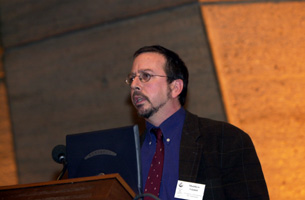
Matthew Gianni (right), Greenpeace International, discussed the threat to world oceans and seas of overfishing, highlighting emerging problems such as lack of fishing
regulation of high seas seamounts, deep sea ridges and plateaus.
|
|
|
|
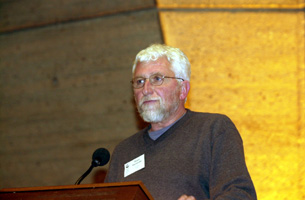
Pietro Parravano (right), World Forum of Fish Harvesters and Fish Workers,
outlined problems in fisheries and described means to address them
including improved science and enforcement measures, integrated management
and professional development among fishermen.
|
|
|
|
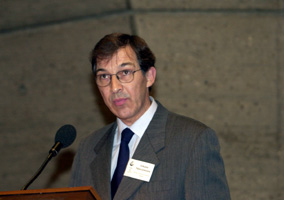
Jóhan Sigurjónsson, Marine Research Institute, Iceland, reported on
the Reykjavik Conference on Responsible Fisheries in the Marine Ecosystem.
|
|
|
|
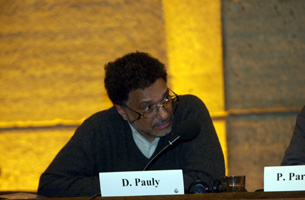
Daniel Pauly, Fisheries Centre, University of British Columbia,
Canada, presented problems in fisheries that are hidden by common
statistics.
|
|
|
|
PANEL 11: PRESENT STATUS
AND FUTURE DIRECTIONS IN MARINE PROTECTED AREAS
|
|
This
panel addressed scientific and political aspects of creating,
implementing, managing and evaluating MPAs, as well as integration of MPAs
in coastal management programs and establishment of MPAs in the high seas.
|
|

Panel Chair
Richard Kenchington, Marine and Maritime Policy Centre, University of Wollongong,
Australia, provided an overview of MPA category designations, noting the
characteristics of each in terms of environmental protection and usage
characteristics. He described factors in MPA category designation and
problems in MPA management.
|
|
|
|
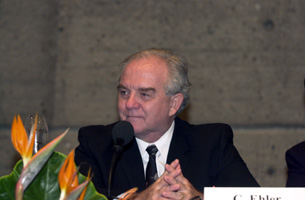
Charles Ehler (right), IUCN World Commission on Protected Areas,
discussed the global status of MPAs. He noted that only 1% of ocean areas
are currently designated as MPAs, their current management is mixed and
many are still "paper parks."
|
|
|
|
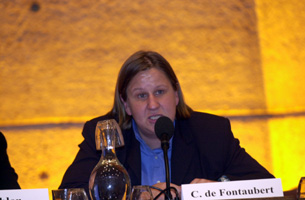
Charlotte de Fontaubert presented a paper by Tundi Agardy, Sound Seas,
on making MPAs work for people and nature. Raising the question of whether
MPAs are created for pure conservation objectives or to also serve people,
she noted the potential of MPAs to integrate management across landscapes,
provide numerous benefits and meet different needs.
|
|
|
|
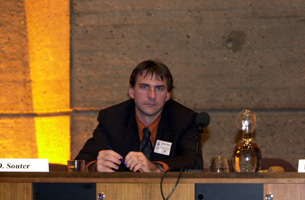
David Souter, International Coral Reef Initiative Secretariat,
reminded participants of the value of coral reefs, including their
function as fish hatcheries and as diverse marine ecosystems.
|
|
|
|
MISCELLANEOUS PHOTOS FROM
THE RECEPTION HOSTED BY THE UNITED STATES:
|
|
|
|
COFFEE BREAK:
|
|
|

|

|

|

|
|
|
|
|
RECEPTION:
|
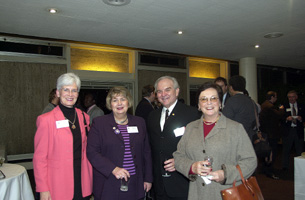
|
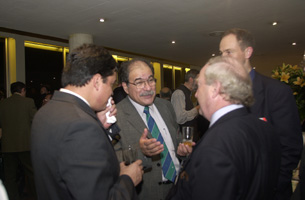
|

|
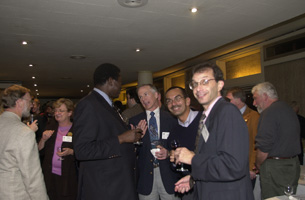
|
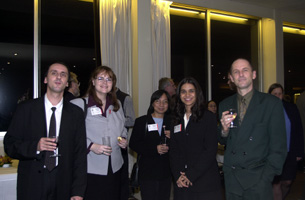
|
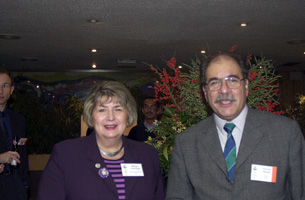
|
|
|
|











